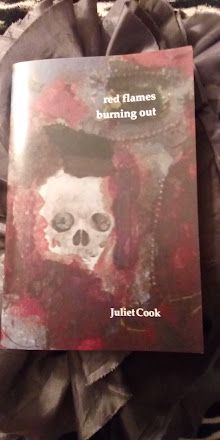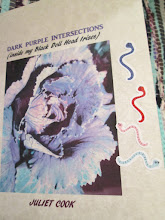4/23/09
co-optation
Last night's conversation involved 'found art', co-opted or reappropriated poetic materials that are not credited as such and whether or not this is acceptable (i.e. when does reappropriation become misappropriation or at least some kind of appropriation that I'm not comfortable with), especially if what's been reappropriated is something that's already been translated and the re-sale of used but laundered women's undergarments. Conversational catalysts inlcuded a poetry chapbook, a book of translated poetry, and a Craigslist advertisement. One comment I made is that I might take an interesting-to-me snippet from a Craigslist advertisement and incorporate it into a poem which would be a kind of recontextualization, which is a practice that does strike me as potentially poetic; however, I would not simply take an interesting snippet and place the snippet in & of itself on a blank sheet of paper and call it my art, because all I did in that case was notice the snippet and cull it, I did not recontextualize it or recast it or incorporate it into an original creation of my own. I don't think a blank sheet of paper counts as a new context and I don't think the act of personal perception in & of itself counts as art. If I place something pre-existing on a blank sheet of paper, that might be interesting to me and it might even be interesting to others, but it is not my art. Of course, this is a very simple example and how does conceptualization play into the definition or value of found art? I was reading a new-to-me book of translated poetry last night; it was published several years ago and I was aware that it existed, but I never read it before. I was suddenly weirdly disturbed to realize that I had inadvertently published two poems by another writer that were very obviously modeled after two poems in this book of translated poems, yet he had made no mention of his source material. I was taken aback by this and wasn't sure how to feel about it, but was certainly not entirely pleased. I felt weirdly culpabale as an editor/publisher in that unbeknownst to me, I had published two pieces that were not exactly original. Basically, the writer had used the structure and tone of the original translated poems and changed some of the words. Okay, it went beyond changing words in that he had made the addition of some of his own unique imagery, yet his poems were so blatantly so clearly modeled after somebody else's translations of somebody else's poems that I felt surprised and somewhat displeased that he had not credited the source material. Certainly, many writers sometimes use other writers' material as creative catalysts or jumping off points for their own material and with varying degrees of infiltration, insinuation, and maybe even sometimes inadvertency, but there was nothing inadvertent about this particular co-optation. Also, this wasn't an appropriation of older historical texts (I'm thinking of something like Genet in Acker), but of contemporary poetry by another contemporary poet...
Labels:
co-optation,
found art,
poetry,
reapproppriation,
recontextualization
Subscribe to:
Post Comments (Atom)



















No comments:
Post a Comment